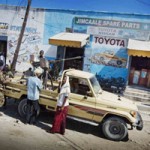
A new database by the Swiss-based NGO Geneva Call collating current and past armed groups’ attitudes towards international humanitarian law (IHL) and human rights law (HRL), could be used to hold them accountable.
“This resource is a unique collection of humanitarian commitments made by armed non-State actors (ANSAs). These commitments have been made in different forms: unilateral declarations or statements, internal rules and regulations, and agreements with governments, inter-governmental and humanitarian organizations,” says the NGO.
Maud Bonnet, Geneva Call’s project coordinator, told IRIN the database reveals armed groups “policies, commitments and views on international humanitarian law and international human rights law”, as well as affording these groups an opportunity to “share their positioning in regards to humanitarian norms”.
Entitled Their Words, Directory of Armed Non-State Actor Humanitarian Commitments, the database is also aimed at national states, UN agencies, NGOs, academics, the media and as “a resource for humanitarian actors to hold ANSAs accountable,” she said.
So far it contains more than 400 documents from armed groups stretching from Senegal’s Mouvement des Forces Démocratiques de la Casamance (MFDC) through to Papua New Guinea’ s Bougainville Revolutionary Army and numerous updated versions of the Mujahedin’s Layeha – the Taliban’s code of conduct.
Among other things, it lists armed groups’ commitments in terms of the protection of civilians and children, the use of land mines and the Geneva Convention.
Geneva Call’s mandate is to engage ANSAs and promote “compliance with the norms of IHL and HRL”. The organization focuses on ANSAs that operate outside effective state control. The International Committee of the Red Cross (ICRC) has also worked extensively with armed groups to instil respect for IHL and HRL.
Often consigned to the margins, the window of opportunity for armed groups to abide by the laws of war is curtailed by the state-bias of IHL and HRL.
The stereotyping of conflicts between two conventional armies facing off on a battlefield has in its own way brushed armed groups to the sidelines, but the existence of such formations – from Spartacus’s slave revolt against Rome, to the 1936-39 Spanish Civil War, and armed groups involvement in at least 48 non-international armed conflicts in 2011 – underscores their role in conflict throughout history.
Legal standing
“Depending on the type of documents – from communiqué, letter, or peace agreement with governments, these documents can have [a] different legal standing. ANSAs are usually not recognized as subjects of international law. These documents could be used to hold the groups accountable in case of violation of IHL,” said Bonnet.
ICRC defines armed groups as “organizations that are party to an armed conflict, but do not answer to, and are not commanded by, one or more states. This broad definition belies the wide diversity of such groups and the complexity of contemporary warfare.”
“Armed groups play a central role with respect to the humanitarian concerns and legal issues involved in conflicts today. A group may fight against the government of its own country, other rival groups, a foreign state, or several states joined in a coalition. For the affected countries, these armed conflicts stand in the way of stability, prosperity, and development. For their populations, they can spell uncertainty about the future, ruin, exile, suffering, or death,” ICRC said.
IRIN News
www.irinnews.org
go/cb
Theme (s): Conflict, Security,
[This report does not necessarily reflect the views of the United Nations]
